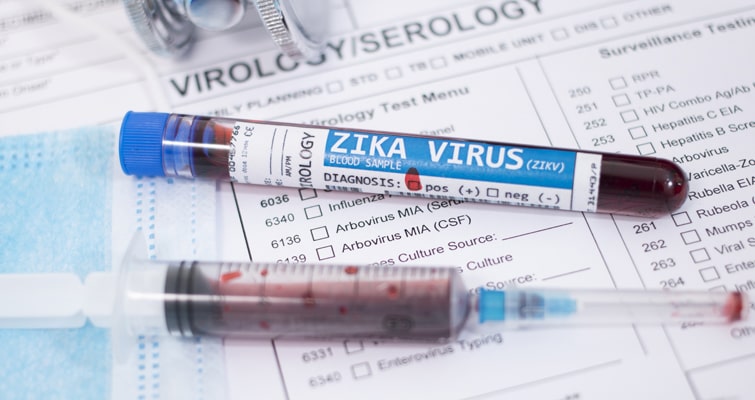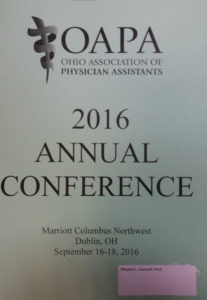 Last September 16-18, 2016, I attended the annual conference for the Ohio Association of Physician Assistants, known as OAPA. I look forward to this conference as an opportunity to learn about new recommendations for the treatment of various diseases, new medications that have become available, and the latest updates to PA practice at the state and national levels. At the conference, I was able to re-connect with former professors and classmates and meet PAs practicing in every specialty you can imagine, from Family Medicine to Emergency Medicine, to Surgery.
Last September 16-18, 2016, I attended the annual conference for the Ohio Association of Physician Assistants, known as OAPA. I look forward to this conference as an opportunity to learn about new recommendations for the treatment of various diseases, new medications that have become available, and the latest updates to PA practice at the state and national levels. At the conference, I was able to re-connect with former professors and classmates and meet PAs practicing in every specialty you can imagine, from Family Medicine to Emergency Medicine, to Surgery.
Every time I attend these conferences, I come away with a fresh perspective on my career and I am reminded of how much I love being a PA. However, I was surprised to hear over and over again throughout the conference that patients are still unclear about the role of a PA. Although I feel that patients have embraced me in our practice and value my involvement in their care; I would like to take the chance to clarify what a PA is and the role we play in the healthcare team.
A physician assistant has many of the same responsibilities as the doctor. We round on patients at the hospital, perform physical exams, order treatment, interpret labs and tests, prescribe medication, and assist in surgery. The level of responsibility varies depending on the specialty of practice, but all PAs practice medicine under the supervision of a physician. Consequently, a PA can practice in any field of medicine available, as long as they have an agreement on file with the state medical board to work with a specific physician or physicians. Although many PAs work in family medicine or in an urgent care setting, greater numbers of PAs can be found working in Emergency Medicine, cardiology, dermatology, and surgical specialties, like plastic surgery.

As a Physician Assistant or PA, I am considered a mid-level provider, meaning I have advanced training beyond that of a nurse, but on the same level as an NP, or Nurse Practitioner. PA school is typically 27 months and is now a Master’s Degree program. For example, I completed my undergraduate bachelor’s degree in 4 years and majored in biology before completing my Master’s in physician assistant studies. Although PA school is shorter than medical school, it is a rigorous program that includes all of the general education taught in medical school, such as anatomy and pharmacology but condensed into 2+years. We also complete clinical rotations in all the major fields of medicine: Family medicine, internal medicine, psychiatry, emergency medicine, OBGYN, pediatrics, and surgery. Most programs allow the student to do several rotations in other areas of interest. For example, I completed additional rotations in plastic surgery and orthopedic surgery.
In order to practice medicine, a PA must take a national board certification exam that covers all aspects of medicine, from cardiology to dermatology, and must re-certify by taking the exam every 10 years. In addition, you must be licensed by your state’s medical board and have a supervision agreement on file with the state board indicating the physician (s) you will be practicing under.
 Although I work in the specific sub-specialty of reconstructive plastic surgery, it is critical that I stay up-to-date with all aspects of medicine in order to provide optimal care for my patients. For example, while I assist in surgery several days of the week, I also determine the appropriate labs to order for pre-op testing based on your medical history, determine the best post-op medication for your situation based on your other medications and risk factors, and can trigger a referral for further workup based on unanticipated physical exam findings and atypical symptoms. Even though breast reconstruction is my focus, I have to be prepared to address diabetes, high blood pressure, gastrointestinal issues, etc, and this conference is one tool to keep me informed on these topics.
Although I work in the specific sub-specialty of reconstructive plastic surgery, it is critical that I stay up-to-date with all aspects of medicine in order to provide optimal care for my patients. For example, while I assist in surgery several days of the week, I also determine the appropriate labs to order for pre-op testing based on your medical history, determine the best post-op medication for your situation based on your other medications and risk factors, and can trigger a referral for further workup based on unanticipated physical exam findings and atypical symptoms. Even though breast reconstruction is my focus, I have to be prepared to address diabetes, high blood pressure, gastrointestinal issues, etc, and this conference is one tool to keep me informed on these topics.

Comments are closed here.